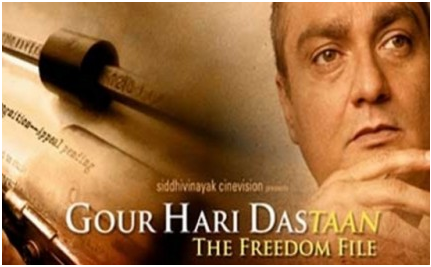Today's Garam Hawa

To see three exquisite, challenging, totally Hindustani films in 24 hours – films which, through the excellence of cinema, the craft of cinema, the demanding truth of cinema – question, with love and passionate understanding, what India really is.
Masaan, by Neeraj Ghaywan – interweaving of tales of love and loss in subtle, and yet powerful, poetry;
Doyen of Farrukhabad, the legend of tabla maestro Ustad Amir Khan, a two-hour documentary of such sustained passion, directed by Nitin Mahadar, that one is left breathless –
And Ananth Mahadevan’s Gour Hari Dastaan – the film I really want to write about – in November of last year I saw M.S. Sathyu’s Garam Hawa, in a revised print, at a cinema hall in Lucknow, with seven of us in the hall – I had seen the film 40 years earlier, but the impact was only heightened, and Balraj Sahni as controlled and as powerful – I saw Gour Hari Dastaan last night in Mumbai, with the same number of fellow-travelers – the people of Lucknow, who pride themselves on being lovers of art and culture, let down Garam Hawa – the people of Mumbai, of which city the Dastaan is, who pride themselves on being lovers of human justice and rights, have let down Gour Hari Dastaan with equal callousness –
But, that is not the real point – that a film like Dastaan can be conceived, shot, completed and released is such a miracle – such a tribute to combined courage and vision and excellence – for Dastaan is today’s Garam Hawa – Vinay Pathak is today’s Balraj-ji – the tale of a man from Orissa seeking recognition for his part in the freedom struggle is no less of a tale than that of the Muslim shoe-maker from Agra seeking his right to be part of a free India – no, Vinay does not have the stature or dignity of the great Balraj-ji – but his Gour Hari is as brave, as noble, as frail as Balraj-ji’s shoe-maker – and Mahadevan (my dear friend, what a journey you have woven for yourself), in the last scene of Dastaan, pays a true tribute to last scene of Garam Hawa. And just as Garam Hawa was, Dastaan is enriched by such fine, fine performances right down the cast – as the great Jalal Agha was in Garam Hawa, so Ranveer Shourey in Dastaan – and on and on – Bharat Dabholkar and Viju Khote, two stalwarts of commercial Marathi theatre, are just so good in their unexpected roles in Dastaan –
But it is Mahadaven’s directorial vision – at the level of script, dialogues, shot-taking, editing, control and delicate human feeling – which makes Dastaan so special; the scene when a smiling postman – another very minor character so well played – brings the final good news to Gour Hari’s patient, and yet not personality-less, wife, is just wonderful – such a touch in memory of a world and a time when letters arrived by mail, delivered by hand, and received by not only by hand, but heart.
The film does have a ironically happy ending – and the journey is full of the same irony –and yet it is a film, a tale which has the courage to question and answer with equal truth –
I feel proud to be an Indian after these 24 hours and these three films – proud that we still pursue excellence, still question, still be Hindustani, still look at ourselves in the mirror which we ourselves are holding up – may we all see these three films, if we have not already done so –and may Ghaywan, Mahadar and Mahadevan go and grow from strength to subtle strength –
Hum ne maanaa ki kuchh nahin, Ghalib –
Muft haath aaye, to buraa kyaa hai --
(Well known actor Tom Alter writes a regular column for The Citizen)



